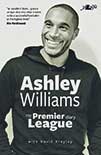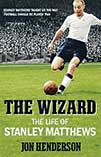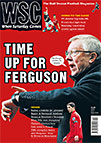 by Ashley Williams with David Brayley
by Ashley Williams with David Brayley
Y Lolfa, £14.95
Reviewed by Huw Richards
From WSC 316 June 2013
The first memory of Ashley Williams remains vivid. Late season 2008, driving a clearance down the right wing at the Liberty Stadium but checking his follow-through so that the ball dropped perfectly for a team-mate. This was clearly not your usual lower-league defender. Five years on he is vastly more familiar but retains the capacity to surprise. Prospective purchasers may (as this one did) quail at a 376-page diary and replace it on the shelves. Swansea fans or not, they should think again or miss something pretty impressive.
It is not that there is any single blinding revelation in his account of Swansea’s 2011-12 season. Instead there is an accumulation of detail, anecdote and observation, forming a compellingly credible picture of footballing life. Credit to David Brayley, who clearly asked the right questions in assembling a book whose clarity and easy conversational flow make for great readability. But co-writers are only as good as their material. It is clear from a terrific opening passage recalling Swansea’s promotion celebrations at Wembley Stadium – with champagne off-limits until Sky say so and Nathan Dyer absent until he does the necessary for a random drug test – that Ashley has the attributes of a good reporter.
He is thoughtful, acutely observant and perceptive. There’s also a sharp self-awareness evident where, for instance, he moans about play-acting by former team-mate Jordi Gómez, then adds “but I have to own up to double standards”, having been happy to accept the fruits of Gómez’s misdemeanours when he played for Swansea.
There’s sharper, clearer tactical analysis than in 100 editions of Match of the Day and intuitive observation of team-mates, notably a brilliant exposition of Leon Britton’s role in Swansea’s rise. No Manchester City fan can be shocked by his view of Scott Sinclair as a gifted player who “probably doesn’t believe in himself enough and actually lacks a bit of confidence”.
He’s refreshingly frank about likes and dislikes, notably of referees. His thoughts on Phil Dowd as “a referee with empathy for the game and the battles that form part of a competitive match” are highlighted by a joyous description of his interaction across a match with Dowd and Kevin Davies. And while no player ever lost by praising his manager, there is little doubt of his genuine admiration for Brendan Rodgers, depicted as a meticulous organiser and superb man-manager who “developed me in so many ways, probably off the field as much as on”.
He concludes by hinting at a sequel. And 2012-13 offers plenty of material: lifting Swansea’s first major trophy, provoking perhaps the silliest post-match whinge of Alex Ferguson’s career and getting tapped up, via the media, by Liverpool and Arsenal. It should be another decent read but still better would be the really good autobiography – taking in his early rejection by West Brom and climb to success via Hednesford, Stockport and Swansea – he clearly has within him.
 The life of Stanley Matthews
The life of Stanley Matthews